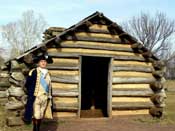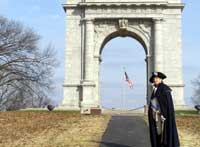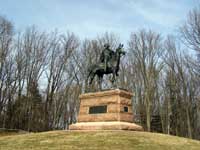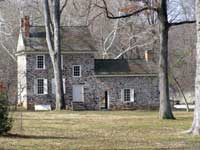Valley Forge - Pennsylvania Historic Site

Washington knew the Winter could be rough on his Army, so he set them immediately to building crude cabins within which to live. Due to the abundance of timber nearby, this was not a problem. All along the hillsides, Washington’s troops constructed shelters of his design to accommodate 12 men each: “dimensions 14 by 16 feet, sides, ends and roof made of logs, the roof made light with split slabs, the sides made tight with clay…”
Even though his troops were able to construct shelters, many had no shoes, little clothing and nothing to eat. Each day brought new challenges with festering wounds and sickness among the men. Dysentery, diarrhea and other maladies plagued the majority of his Army. It is estimated that out of an original 12,000 troops, approximately 2,000 perished. Conditions became so horrible, on some nights men would begin yelling “No bread, no soldier!” As conditions continued to worsen, dozens of men began yelling out loud “No meat!! No meat!!” Washington was not far from them and he heard their cries.
Writing to the President of the Continental Congress on December 23rd, he begged for assistance. “The Army must inevitably be reduced to one or other of three things- starve, dissolve or disperse…” With only “fire cakes and water”, the men managed to hang on. It is truly a miracle that any survived. Yet Washington was a deeply religious man who believed in Divine Providence. He knew deep down inside that their cause was just and they must prevail. It appears God heard his pleas. In early January 1778 Washington got some good news- a letter from Baron Frederick von Steuben, offering his services as a volunteer. Von Steuben had served 25 years before on the staff of Frederick the Great of Prussia and promised to share his knowledge of military tactics and training with Washington’s Army. He came just in time.
More than anyone at Valley Forge, von Steuben was responsible for making this rag-tag, undersupplied and somewhat inexperienced Army into a disciplined fighting force. His regular drills and strict regimen of training helped re-kindle the patriotic fervor amongst the men, who desperately needed something to believe in. His rigorous tactics gave them the self-confidence and energy to survive- and they did, staying at Valley Forge for six months into the Spring of 1778.Today Valley Forge is a National Park where you can walk the open fields which have replica structures from the encampment, Washington's Headquarters (original structure) and a visitor center containing a museum along with a film and gift shop.



